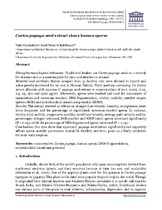Carica papaya seed extract slows human sperm
Abstract
Ethnopharmacological relevance: Traditional healers use Carica papaya seeds as a remedy for diseases and as a contraceptive for men and abortion in women.
Material and methods: Semen samples from 35 healthy men were allowed to liquefy and subsequently incubated for 60 min in Human Tubular Fluid medium containing 1% bovine serum albumin with aqueous C. papaya seed extract at concentrations of zero, 0.025, 0.25, 2.5, 25, 250 and 2500 μg/ml. Afterwards, sperm were washed and used for assessment of capacitation and acrosome reaction, DNA fragmentation, vitality, motility, reactive oxygen species (ROS) and mitochondrial membrane potential (MMP).
Results: The extract showed no effects on straight-line velocity, linearity, straightness, beat-cross frequency and the percentage of capacitated, acrosome-reacted sperm. In contrast, vitality, total motility, progressive motility, curvilinear velocity, average-path velocity and the percentages of hyper-activated, ROS-positive and MMP-intact sperm decreased significantly (P < 0.05), while the percentage of DNA-fragmented sperm increased (P < 0.05).
Conclusions: Our data show that aqueous C. papaya seed extract significantly and negatively affects sperm motility parameters crucial for fertility; and thus, poses as a likely candidate for male contraception.

